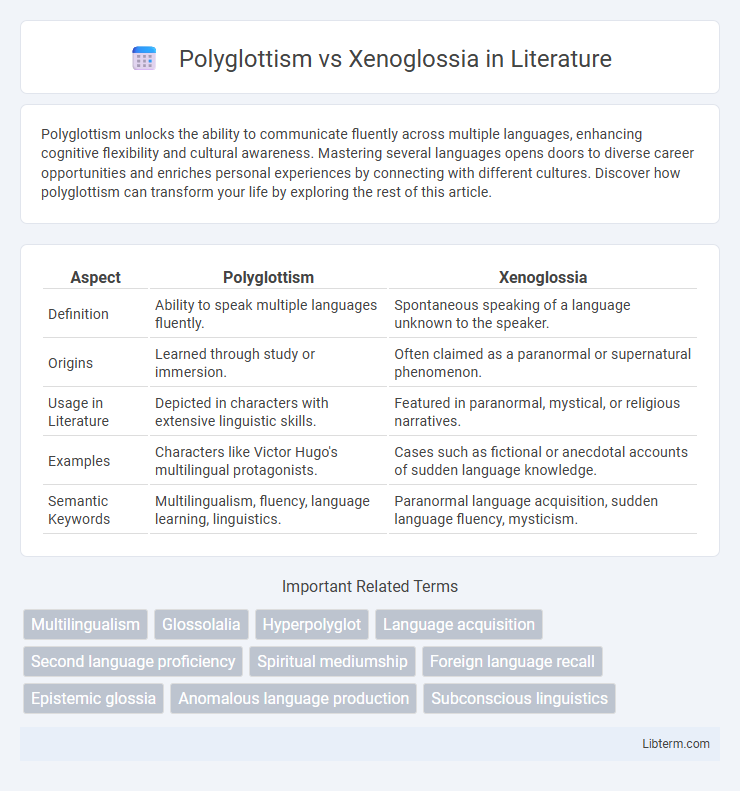Polyglottism unlocks the ability to communicate fluently across multiple languages, enhancing cognitive flexibility and cultural awareness. Mastering several languages opens doors to diverse career opportunities and enriches personal experiences by connecting with different cultures. Discover how polyglottism can transform your life by exploring the rest of this article.
Table of Comparison
| Aspect | Polyglottism | Xenoglossia |
|---|---|---|
| Definition | Ability to speak multiple languages fluently. | Spontaneous speaking of a language unknown to the speaker. |
| Origins | Learned through study or immersion. | Often claimed as a paranormal or supernatural phenomenon. |
| Usage in Literature | Depicted in characters with extensive linguistic skills. | Featured in paranormal, mystical, or religious narratives. |
| Examples | Characters like Victor Hugo's multilingual protagonists. | Cases such as fictional or anecdotal accounts of sudden language knowledge. |
| Semantic Keywords | Multilingualism, fluency, language learning, linguistics. | Paranormal language acquisition, sudden language fluency, mysticism. |
Introduction to Polyglottism and Xenoglossia
Polyglottism refers to the ability of an individual to fluently speak multiple languages, often acquired through formal education, immersion, or natural aptitude, showcasing linguistic versatility and cognitive flexibility. Xenoglossia is a rare phenomenon in which a person can speak or understand a language they have never learned by conventional means, often associated with paranormal or spiritual contexts. Understanding the distinction between polyglottism's learned multilingualism and xenoglossia's unexplained language acquisition is essential in fields such as linguistics, psychology, and parapsychology.
Defining Polyglottism: The Science of Multilingualism
Polyglottism refers to the ability of an individual to fluently speak and understand multiple languages, often attained through education and immersion. It is supported by cognitive science studies highlighting enhanced neural plasticity and improved executive functioning in polyglots. Unlike xenoglossia, which involves inexplicable or spontaneous knowledge of unknown languages often linked to paranormal phenomena, polyglottism is grounded in linguistic skill development and cognitive adaptation.
Understanding Xenoglossia: Myth or Phenomenon?
Xenoglossia, often portrayed as the sudden ability to speak or understand a language never learned, remains a controversial phenomenon lacking robust scientific evidence. Unlike polyglottism, which is the demonstrable multilingual fluency developed through study and practice, xenoglossia is frequently reported in contexts involving hypnosis, possession, or paranormal claims. Rigorous linguistic analysis and neuroscience research suggest xenoglossia may be explained by cryptomnesia, subconscious memory retrieval, or psychological factors rather than genuine spontaneous language acquisition.
Key Differences Between Polyglottism and Xenoglossia
Polyglottism refers to the natural or acquired ability of an individual to speak multiple languages fluently, often through study and practice, while xenoglossia involves the phenomenon of speaking or understanding a language unknown to the speaker by normal means, sometimes considered paranormal. Key differences include polyglottism's basis in linguistic skill development versus xenoglossia's association with supernatural or spontaneous language acquisition. Polyglottism is widely documented and scientifically studied, whereas xenoglossia remains controversial and largely anecdotal.
Historical Accounts of Polyglots
Historical accounts of polyglots highlight individuals such as Giuseppe Mezzofanti, who reportedly mastered over 30 languages, demonstrating natural linguistic aptitude and rigorous study. Polyglottism involves deliberate learning and comprehension of multiple languages, contrasting with xenoglossia, where a person seemingly speaks a foreign language without prior exposure or learning. Documented polyglots throughout history have contributed to linguistics by translating texts and preserving endangered languages, validating polyglottism as an achievable skill through education and practice.
Documented Cases of Xenoglossia
Documented cases of xenoglossia often involve individuals spontaneously speaking or understanding a foreign language unknown to them by natural means, distinguishing it from polyglottism, which is characterized by natural multilingual proficiency. Notable instances include the 19th-century case of Bridey Murphy and documented reports in parapsychology where subjects recite coherent phrases in obscure languages without prior exposure. Scientific scrutiny remains skeptical due to the lack of verifiable linguistic proficiency and potential explanations involving cryptomnesia or suggestibility.
Cognitive and Neurological Perspectives
Polyglottism involves the ability to fluently speak multiple languages due to extensive learning and brain plasticity, engaging areas like the Broca's and Wernicke's regions for language production and comprehension. Xenoglossia, often reported in parapsychology, lacks empirical neurological evidence and is characterized by sudden, unlearned language abilities, making it distinct from the cognitive mechanisms underpinning polyglottism. Neuroimaging studies reveal that polyglot brains exhibit enhanced connectivity and neuroplasticity, whereas xenoglossia remains a phenomenon without concrete cognitive or neurological explanation.
Cultural and Social Implications
Polyglottism, the ability to speak multiple languages fluently, fosters cross-cultural communication, enhances social integration, and promotes empathy towards diverse communities. Xenoglossia, the phenomenon of speaking an unknown language without prior learning, often raises cultural curiosity but can lead to social skepticism or mysticism in various societies. Both phenomena influence identity formation and intercultural relations, impacting how individuals connect within multicultural settings.
Scientific Investigations and Controversies
Scientific investigations into polyglottism reveal it as a cognitive phenomenon where individuals acquire multiple languages through learning and practice, often studied in linguistics and neurology for its effects on brain plasticity and memory. Xenoglossia, characterized by the sudden ability to speak a language unknown by natural means, is largely debated in parapsychology and lacks empirical support, often attributed to psychological or fraudulent explanations. Controversies center on the methodological challenges in verifying genuine cases of xenoglossia versus the well-documented, neurologically grounded processes underlying polyglottism.
Future Research and Unanswered Questions
Future research in polyglottism and xenoglossia should explore the neurological underpinnings distinguishing natural multilingualism from purported instantaneous language acquisition. Investigating brain imaging patterns and genetic markers may clarify the cognitive mechanisms involved and address skepticism surrounding xenoglossia claims. Unanswered questions remain about the potential for latent language capacities in the human brain and the validation of xenoglossia through rigorous scientific protocols.
Polyglottism Infographic

 libterm.com
libterm.com